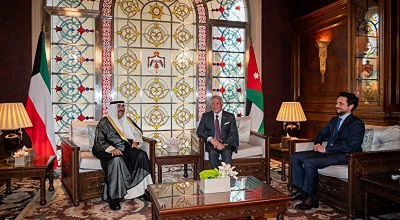The biggest potential danger to Jordan’s King Abdullah II is himself - By David Ignatius, Washington Post
Perhaps there’s a real coup plot amid the rumors that have been swirling around Jordan’s King Abdullah II and his charismatic half brother Hamzeh bin Hussein. But what’s certain is that we’re watching a riveting episode in the Jordanian version of “The Crown” — in which the messy family politics common to most royal dynasties are afflicting the Hashemites.
The most worrying aspect of the Jordan flap is that Abdullah may have contracted the obsession with imagined social-media enemies that has destabilized other Middle East leaders, from Saudi Arabia’s Crown Prince Mohammed bin Salman to Egypt’s President Abdel Fatah al-Sissi.
Tuesday’s order by Jordan’s public prosecutor banning the media from discussing his case seems just the latest example of Arab royalty’s social-media panic. If it continues, it could signal a transformation of Jordan’s soft but generally benign autocracy into something more sinister.
The Hashemites had seemed to have patched over their royal breach Monday in a dynastic family hug. Former crown prince Hassan, now 74 — painfully removed from succession by his brother Hussein in favor of Abdullah just weeks before Hussein’s death in 1999 — mediated a truce between the current monarch and Hamzeh, who was in line for the throne until Abdullah sacked him as crown prince in 2004 and installed his own son.
Hamzeh pledged allegiance in a dutifully respectful letter signed Monday: “The interests of the homeland must remain above all else, and we must all stand behind his majesty the king and his efforts to protect Jordan and its national interests.” But social media posts by his supporters continued, along with a leaked audio of Hamzeh on Saturday dismissing an emissary from the palace, and the king evidently got the jitters.
Amman could compete with Hamlet’s Elsinore Castle or Cesare Borgia’s Rome as a center of intrigue. The palace is surrounded by conniving courtiers, ambitious princes and princesses, needy tribal chiefs, meddling neighbors — and wily intelligence chiefs spinning gossip about coup plots, real and fanciful. The king never has enough money for all the family coffers, so corruption in high places is an inevitable fact of life.
Abdullah has been king for 22 years, but the palaces that dot the hills of Amman are haunted, still, by memories of the late King Hussein, his charismatic father. Hussein gave his own memoir the Shakespearean title, “Uneasy Lies the Head” (that wears the crown). In a story about him 40 years ago for the Wall Street Journal, I counted nearly a dozen coup and assassination plots. Conspiracy talk is ceaseless in Amman, but sometimes it’s real.
Hamzeh seems to threaten Abdullah partly because he looks and sounds so much like their late father. Hamzeh compounded this anxiety over the past year by reaching out to the Bedouin tribes that bolster Jordan’s military and intelligence services — and by maintaining a visible social media presence. That culminated in an abrupt visit Saturday from Maj. Gen. Youssef al-Huneiti, the chief of the Jordanian military, who ordered Hamzeh to keep quiet, which friends say only rankled him more.
What set the gossip buzzing was the string of prominent people arrested at the same time Hamzeh was visited by the military chief. The list included two members of the powerful Majali tribe, a former head of the royal court and a well-connected businessman-fixer with close ties to Saudi Arabia’s crown prince. Several well-placed Jordanians told me they doubted that this amounted to a real firestorm of sedition against Abdullah, but it certainly provided some smoke.
Another wild card: Jordan’s current intelligence chief, Ahmed Husni (like all his predecessors known by the Ottoman honorific, “Pasha”), is a Circassian who has served in the post less than two years. Some Jordanians contrast his tough demeanor with the gentle style of his predecessor, Adnan al-Jundi. The new pasha is loyal to Abdullah, perhaps to a fault.
Monarchies present an image of stability, but it often masks deep anxieties. The House of Saud, for example, has always had a brotherly rivalry with the Hashemites in Jordan, because of Riyadh’s fear that Muslims might view the Hashemites, who as descendants of the prophet Muhammad ruled Mecca and Medina for centuries, as the true guardians of the Holy Places.
Saudi Crown Prince Mohammed bin Salman is perhaps the best example of a reform-minded royal who subverted his dreams for his kingdom by listening to courtiers’ talk of alleged plots against him on social media — by Post contributor Jamal Khashoggi, among others. Uneasy lies the head . . .
Whatever conspiratorial talk may be buzzing around Amman now, the biggest potential danger to Abdullah is himself — if he listens to voices telling him to muzzle dissent, crush potential rivals and wreck the foundations of modern Jordan’s stability. Only a very unwise monarch would choose that course.
Latest News
Most Read Articles
- Safadi discusses support to Syrian refugee with DRC
- King, Kuwait emir reaffirm pride in deep-rooted relations
- Israeli Occupation aggression on Gaza enters 200th day
- UNRWA’s role in Gaza indispensable — Foreign Ministry
- Jordan condemns Israeli 'war crimes' in Gaza, calls for accountability
- Baby delivered from dying mother's womb in Gaza 'miracle'
- General Motors lifts 2024 profit forecast after strong Q1
- Kuwait channels $24 billion in development assistance to Jordan in 24 years
- King orders holding parliamentary elections in accordance with law, checks on electoral commission’s preparations
- Azerbaijan says ‘closer than ever’ to Armenia peace deal amid border talks




